News
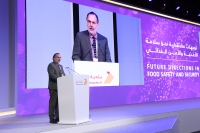
11/11/2022
Markus Lipp, FAO Senior Food Safety Officer, spoke at the opening of the 16th Dubai International Food Safety Conference at the Dubai World Trade Center on 1 November. The three-day conference focused on strategic ways to maintain food safety and food security, including through the use of innovations and technologies to strengthen the supply chain. More than 3 000 international experts representing international organizations, national institutions and private sector entities, were in attendance.
Here is what he said:
Excellencies, Ministers, Ambassadors, Ladies and Gentlemen, good morning and good day to all of you.
My sincere thanks to Her Excellency Mariam bint Mohammed Saeed Hareb...

04/11/2022
A group of 24 experts from 15 countries identified the food safety hazards associated with cell-based foods while gathered in the Republic of Singapore on 1-4 November 2022. The experts – who have gained knowledge of cell-based food in the public and private sectors, academia, research and non-government organizations - discussed the potential food safety issues in a 3.5-day meeting convened by the Food and Agriculture Organization of the United Nations (FAO), in collaboration with the World Health Organization (WHO).
The experts found that with cell-based food, we run the same risks as with conventionally produced food: the occurrence...
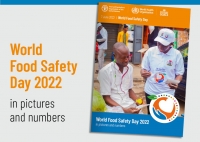
26/10/2022
The report on the observance of World Food Safety Day 2022 has now been released in all six official UN languages with the title “World Food Safety Day 2022 in pictures and numbers”, offering an overview of this year’s events. Observances were held in at least 109 countries for the fourth annual World Food Safety Day.
Events included webinars and conferences and a wide variety of awareness-raising activities such as quizzes, tasting sessions with food safety tips, sports events and oratory competitions, as well as food safety surveys and media presentations. Notably, there were many school activities organized in different parts...

19/10/2022
The Food and Agriculture Organization of the United Nations (FAO), in collaboration with the World Health Organization (WHO), organized an online meeting entitled “Food safety and cell-based food: why terminology matters?” on 6 October 2022, as a pre-session to the upcoming expert on cell-based food that will take place in Singapore on 1-4 November 2022.
Dr Mark Sturme from Wageningen Food Safety Research, Wageningen University and Research, the Netherlands, presented the paper entitled “Food safety aspects of cell-based food - Background document one: Terminologies” which he authored together with Dr Gijs Kleter from the same institution. Also, Dr William...
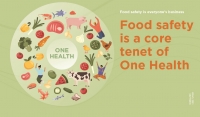
18/10/2022
Four international organizations have formulated an action plan to sustainably balance and optimize the health of humans, animals, plants and ecosystems – which includes strengthening food safety as one of the six interdependent action tracks. On 17 October 2022, FAO, together with the United Nations Environment Programme (UNEP), the World Organisation for Animal Health (WOAH, founded as OIE) and the World Health Organization (WHO) launched the One Health Joint Plan of Action (2022–2026).
The document will help guide the four organizations, or ‘Quadripartite’, in promoting a collaborative approach, involving various sectors, disciplines and communities worldwide to better prevent, predict, detect and...
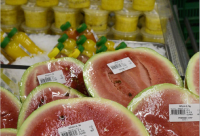
17/10/2022
A new FAO publication looks into this question. The document, titled Microplastics in food commodities – A food safety review on human exposure through dietary sources, outlines the existing literature on the occurrence of microplastics and their associated contaminants in foods. It also estimates the dietary exposure of consumers to these materials; highlights some knowledge gaps with respect to their relevance to public health; and offers some recommendations for future work on microplastic particles to support food safety governance.
Micro- and nanoplastics have been detected in fishery products and other food commodities, raising concerns about their impact on human health....
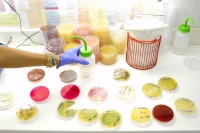
14/10/2022
It was the best of times, it was the worst of times. It is the age of wisdom, it is the season of foodborne disease. Advances in microbiological risk assessment provide the spring of hope to overcome the despair caused by harmful foodborne bacteria.
Two new publications were released this week that will help risk managers address microbiological-related food safety issues, namely: Listeria monocytogenes and Shiga toxin-producing Escherichia coli (STEC). These two reports are part of the series of microbiological risk assessments (MRA) published by the Joint FAO/WHO Expert Meetings on Microbiological Risk Assessment (JEMRA).
We spoke with Kang Zhou, FAO Food...
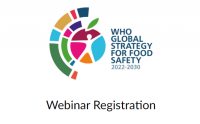
11/10/2022
The World Health Organization (WHO) is going to introduce its Global Strategy for Food Safety (2022-2030) during a webinar on 17 October 2022 at 12:00-13:00 CET. In the hour-long session, the WHO Department of Nutrition and Food Safety will explain how WHO, partners and the members of the Technical Advisory Group on Food Safety are working to support Member States in the implementation of the strategy.
The 73rd World Health Assembly approved the 8-year strategy in May of this year. The vision set forth in the strategy is to ensure that all people, everywhere, consume safe and healthy food so as...
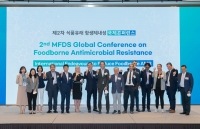
06/10/2022
The Global Conference on Foodborne Antimicrobial Resistance (AMR), held on 27-28 September 2022 in Seoul, the Republic of Korea, highlighted the need for a One Health approach to address antimicrobial resistance in food. Collaboration across sectors to promote human, animal, plant and environmental health would result in greater food safety, the conference heard.
This Global Conference on Foodborne AMR is a forum where participants can learn, share ideas, and be empowered to adopt strategies to combat antimicrobial resistance in the food supply. The event was organized by the Ministry of Food and Drug Safety (MFDS), the Republic of Korea. This year's...

03/10/2022
The Food and Agriculture Organization of the United Nations (FAO) and Danone have been collaborating to improve global nutrition and food safety knowledge and promote sustainable food systems since 2019 under a Memorandum of Understanding (MOU).
In this context, FAO and Danone set out to review the current trends and drivers linked to the emergence of new food allergens and reflect on future perspectives for this area. These findings are shared in the joint review, Are alternative proteins increasing food allergies? Trends, drivers and future perspectives, recently published in the journal, Trends in Food Science & Technology.
“As we search...
Stay up to date and connect to our RSS feed!
